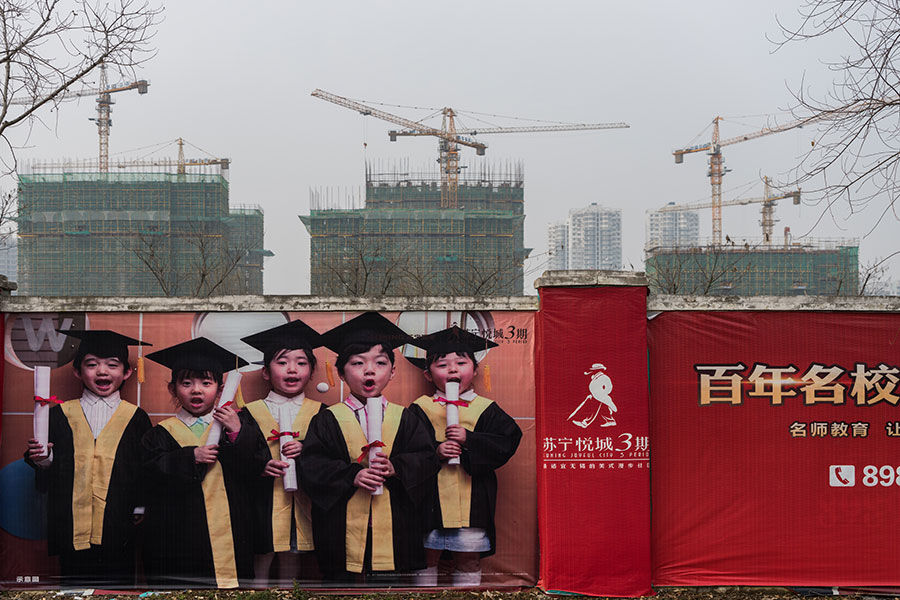Chinese tots spur home markets abroad
By Wang Ying in Shanghai | China Daily | Updated: 2019-06-10 07:44

Young parents buy or lease properties near schools overseas to give their kids a head start for life in a globalized world
The trend of Chinese parents pulling out all the stops to secure a bright future for their children has intensified this year. Their investments in both top-quality foreign education and homes near schools overseas have surged as China's economic rise stokes aspirations of the newly affluent middle-income group, said industry insiders.
Sally Wang, who has been working as a realty agent in London for nearly a decade and is founder of real estate agency SJW (UK) Property Investment Ltd, said demand for prime UK properties near educational institutions from young Chinese parents shows no signs of abating.
In fact, thanks to demand from Chinese parents, SJW saw a 50-percent growth in the transaction value of sales of homes in the past two years. A majority of them were located near schools, colleges and universities.
Wang cited a recent instance involving her clients, Beijing-based Chinese parents of a 4-year-old boy. Wang showed the couple a dozen apartments near Hyde Park in London. After viewing them all, the couple selected a three-bedroom flat within half-hour walking distance from their little son's school.
They were willing to fork out 4 million pounds ($5.09 million) as the flat comes with facilities like security, a receptionist desk, gym, swimming pool and parking space.
Wang said if they manage to close the deal, they should consider themselves lucky because these days it is still a challenge to find a home at a convenient location up for sale.
In prized areas, newly developed residential projects are few and far between. "There are still several months to go before the little boy gets enrolled in September, and we will try our best to make the deal happen," said Wang.
Young Chinese parents' anxiety and eagerness about their kids' future go back a long way. A story tracing back to 365 BC goes that the mother of great Chinese philosopher Mencius moved home three times to ensure an environment conducive to her son's education.
Investment in kids' education is seen as essential because children represent the future of the family tree. And a good home at a convenient location in the school's neighborhood dovetails with this overall theme.
In the highly competitive, globalized, digital world of today, parents think high-quality education is essential from a very young age, preferably at reputable institutions in English-speaking countries, industry insiders said.
This narrative, accentuated by the property industry's marketing spiel, has been driving up home prices in the United States, the United Kingdom, Canada and other English-speaking countries.
"The number of Chinese students studying abroad from a young age has risen substantially in recent years. This has been driving up demand for rentals as well as home sales near prestigious schools," said Slevin Wang, director and joint head of international residential projects, CBRE China.
Agreed Annie Hu, co-founder of realty agency Hyde Global in London. "In the past couple of years, there has been a conspicuous rise in the number of our clients with school-bound children."
Hu said nearly 40 percent of her company's clients are Chinese looking for homes near sought-after London schools for their children aged below 12.
"That figure was between 10 percent and 20 percent about two to three years ago. Back then, there were fewer Chinese parents with young kids aged 3 to 5 among our clients," said Hu, who has been working in the London housing market for seven years now.
Property agents in the US and Australia report similar findings. "Kids' education is by and large the main reason why young Chinese parents continue to buy properties in the US," said Tina Dai, a Shanghai native who turned a real estate agent with JC Pacific Capital Inc in Los Angeles after relocating to the US in 2013.
Dai herself bought a home so her daughter could secure admission into a well-known public school in her LA neighborhood.
Jamie Mi, head of international business at Kay& Burton, a high-end real estate agency in Melbourne, said: "China is Australia's biggest source of overseas students. Chinese parents provide strong support for demand for home sales Down Under."
Apartments adjacent to high-quality public schools conventionally carry a higher price tag in China. But Chinese parents are willing to pay even more if necessary for similar conveniences in other countries. That's because overseas residential properties can also generate steady returns on realty investment, according to industry insiders.

At Diamond Bar, an LA district where Dai's little daughter is about to enroll into Evergreen Elementary School, a reputable public school, a two-bedroom apartment commands a price in the range of $400,000 and $500,000.
That is still less than $709,000, or 4.9 million yuan, that a 90-square meter, two-bedroom flat would have cost in April at premium residential areas in Shanghai, where new homes sell at an average price of 54,838 yuan per square meter, according to data from Centaline Shanghai, a realty agency.
"Home prices in Shanghai are broadly comparable with those in New York and Tokyo," said Lu Wenxi, a researcher with Centaline Shanghai.
Among 35 key global cities in terms of home prices, China's Hong Kong, Shanghai, Shenzhen and Beijing were rated first, third, fifth, and ninth most expensive cities respectively by CBRE.
According to Mi of Kay & Burton, more than 80 percent of the Australian firm's customers are Asian families with school-going children. From kindergartens to senior middle schools, all educational institutions are much sought after, stoking demand for homes in their neighborhood as well.
"Homes located in school areas are ideal investment for young parents because they can easily resell them later for a profit, or lease them out for stable returns in the future," said Dai of JC Pacific Capital.
A local resident, be it a homeowner or tenant, is eligible to apply for his or her children's admission into a US public school in the local district, but private schools are generally considered to be better.
The US has about 15,000 school districts with public schools ranging from kindergarten to 12th grade, or middle school, which are rated. Those rated high are expensive as they tend to collect fees toward property tax, building renovation, facility upgrades and teacher wage raises. The situation in the UK is comparable in this context.
In 2017, as many as 608,400 Chinese students studied abroad, a year-on-year growth of 11.74 percent. Chinese thus maintained their position as the largest overseas student group by nationality, according to data from China's Ministry of Education.
The US remains the top destination for all international students. More than 363,341 Chinese students enrolled into US universities and colleges in the academic year 2017-18, accounting for one-third of the total 1.09 million international students in the country, according to the Open Doors 2018 report on education and culture from the US embassy in Beijing.
Inadequate opportunities for premium education in China, coupled with the new-found affluence of the middle-income group, are driving demand for overseas education, industry insiders said.
"Since China's opening-up, a growing number of Chinese parents who can afford overseas education for their kids, have been applying for school admissions in foreign countries, particularly developed countries with high-quality education and research resources," said Huang Jianru, an education industry expert with Xiamen University.
Carrie Law, CEO and director of Juwai, a Shanghai-based realty agency specializing in sales of overseas homes, said that Australia, the US, Canada, the UK, New Zealand and Singapore are the top six destinations for Chinese parents looking to buy a home for their kids bound for education abroad.
Wang of CBRE said the UK's policies to attract international students are paying off. Now, Chinese college entrance examination results are accepted by distinguished universities, including Cambridge University. As many as 99,700 students from China received UK visa in 2018, 13 percent more than the previous year, according to data from the British Home Office.
"English is a compulsory course at most Chinese schools since the Chinese opening-up, which is stoking demand for education and homes in English-speaking countries," said Huang.
Another reason is the perception that English proficiency will lead to more job opportunities and brighter future prospects globally, said Wang.
Amid all this rush for homes abroad, Chinese parents are becoming more cautious and rational in their investments, and underlining service. Mi of Kay & Burton said: "Instant decisions of the past have made way for well-considered choices preceded by viewings of four or five homes."
Those who expect hefty returns on overseas property investments made for children's education purpose might get disappointed. Mature markets like the US and the UK will not see high-percentage growth year-on-year as there is not "enough growth potential in the foreseeable future", said Yu Ran, who just bought a three-bedroom flat in Melbourne.
The US-China trade tensions, and the debate in the US about immigration policies, will likely push some Chinese students to move to Canada and Australia from the US, according to Law of Juwai.
Experts noted the rising rejection rate of US visa applications is likely to deflect more Chinese overseas students to other English-speaking countries. China's Ministry of Education said on June 3 that 13.5 percent of visa applications of government-backed students, submitted from January to March, were rejected by the US, a sharp rise from 3.2 percent in the same period last year.
This has been a trend in the past few months. Some US student visas are issued with shorter validity period, affecting Chinese students' education plans. So, the latter should assess risks and prepare well before they decide to study abroad, said Xu Mei, spokeswoman of the Ministry of Education.
























